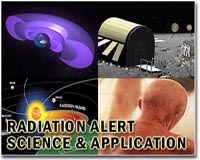 |
Manila (AFP) March 29, 2011 Small amounts of radiation from Japan's leaking nuclear power plant have spread across Asia, authorities said Tuesday, deepening concerns for millions of people already wary of eating Japanese food. The governments of China, South Korea, the Philippines and Vietnam reported that radiation had drifted over their territories, although they emphasised the levels were so small that there was no health risk. "We would like to ask the public not to panic. These are very tiny amounts in the air," Philippine Nuclear Research Institute spokeswoman Tina Cerbolis said, echoing officials in the other countries to have detected the radiation. "I can firmly assure you that this amount will not have an iota of impact on the lives of ordinary Koreans," Korea Institute of Nuclear Safety chief Yun Choul-Ho told reporters in Seoul. Nevertheless the development was another reminder for people across the Asia Pacific about the rippling impacts of the damaged Fukushima power plant more than two weeks after a huge earthquake and tsunami crippled the facility. Traces of radiation had in actual fact drifted all the way to the United States, with rainwater in Ohio found to have been contaminated on Monday, environment authorities there said. People and governments living in countries neighbouring Japan had already taken a range of precautionary measures as they watched the crisis escalate. Authorities across the region began testing Japanese food imports for radiation, while some vegetables grown near Fukushima were banned altogether. Travellers returning from Japan also started to be screened at some airports for radiation. In China, two Japanese travellers were hospitalised last week after airport officials detected elevated radiation levels on them, although they were later discharged. Taiwan's Atomic Energy Council reported Tuesday that small amounts of radioactive particles had been detected on 43 passengers from Japan since the crisis began. The shipping industry has also grown increasingly nervous about vessels potentially sailing into contaminated waters off the coast of Japan. Chinese authorities said last week that radiation had been detected on a Japanese merchant vessel that berthed in the southeastern port city of Xiamen. In another development on Tuesday underlining rising fears about potentially dangerous radiation spreading across the region, South Korean officials said they had begun screening fish caught in their own waters. Fish including mackerel and hair tail were being tested for caesium, iodine and other radioactive materials, although none had been detected, a South Korean agricultural ministry told AFP. Some European buyers of South Korean farm produce had also started demanding that shipments undergo radiation tests, sending farmers rushing to nuclear safety agencies for screening, Yonhap news agency reported. In China, the health ministry ordered authorities in Beijing, Shanghai and other highly populated areas to test drinking water and food for radiation, according to the state-run China Daily newspaper. Greenpeace International nuclear expert Rianne Teule said people outside of Japan should not be panicked by the spreading plume of radiation across Asia and further afield. "The levels (of radiation) that are reaching countries far away are so low that they will not be a significant health risk," Teule told AFP by phone from Amsterdam. However she said there was no completely safe level of radiation and that, as more radiation spread, the risks would grow. "If a very large population is exposed to a very low level of radiation, it will overall increase the cancer risk for that population," she said. burs-kma/ft
Share This Article With Planet Earth
Related Links Space Technology News - Applications and Research
 Radiation scare at Japan nuclear plant
Radiation scare at Japan nuclear plantKitakami, Japan (AFP) March 27, 2011 Dangerous levels of radiation detected in water thought to be leaking from a stricken Japanese reactor dealt a new setback Sunday to efforts to avert a nuclear disaster. Radiation in puddles near reactor two at the Fukushima plant was more than 1,000 millisieverts per hour, forcing the evacuation of workers toiling to restore the cooling systems, operator Tokyo Electric Power (TEPCO) said. ... read more |
|
| The content herein, unless otherwise known to be public domain, are Copyright 1995-2010 - SpaceDaily. AFP and UPI Wire Stories are copyright Agence France-Presse and United Press International. ESA Portal Reports are copyright European Space Agency. All NASA sourced material is public domain. Additional copyrights may apply in whole or part to other bona fide parties. Advertising does not imply endorsement,agreement or approval of any opinions, statements or information provided by SpaceDaily on any Web page published or hosted by SpaceDaily. Privacy Statement |